Who created the heavens and the earth?
See Genesis 1:1, Isaiah 40:26, 42:5, 44:24.
How did He create them?
See Genesis 1:3,6,9,11,14,20,24,26, Psalm 33:6, 2 Peter 3:5.
From what did God create the heavens and the earth?
See Romans 4:17, Hebrews 11:3.
What part did Jesus Christ have in the creation?
See John 1:1-3,10, 1 Corinthians 8:6, Colossians 1:16.
How long did it take God to create the heavens and the earth, and all that is in them?
See Genesis 2:1-3.
What leads us to believe that the creation took place in 6 literal days?
See Exodus 20:9-11.
Does a “big bang” billions of years ago make more scientific sense than a literal 6-day creation thousands of years ago?
In the beginning was the ylem…or so the theorists say. The “ylem”—an entirely hypothetical construct—was a primordial substance 1014 times the density of water, yet smaller in volume than a single proton. As one writer expressed it: Astonishingly, scientists now calculate that everything in this vast universe grew out of a region many billions of times smaller than a single proton, one of the atom’s basic particles (Gore, 1983, 163:705).
The ylem (a.k.a. the “cosmic egg”) was a “mind-bogglingly dense atom containing the entire Universe”.
Where, exactly, the cosmic egg is supposed to have come from, no one knows; so far, no cosmic chicken has yet been sighted!
At some point in time the ylem reached its minimum contraction and suddenly and violently expanded.
Avoid profane and vain babblings, and oppositions of science falsely so called.
1 Timothy 6:20, KJV
May 2004: Dissidents wrote an open letter published in New Scientist warning that failure to fund research into big bang alternatives was suppressing free debate in the field of cosmology.
Crisis in Cosmology conference: June, 2005. Researchers gathered in Moncao, Portugal to discuss how the Big Bang fails to explain crucial observation.
“The basic big bang model fails to predict what we observe in the universe in three major ways.” The temperature of today’s universe, the expansion of the cosmos, and even the presence of galaxies, have all had cosmologists scrambling for fixes.
“Every time the basic big bang model has failed to predict what we see, the solution has been to bolt on something new—inflation, dark matter and dark energy”–Riccardo Scarpa of the European Southern Observatory in Santiago, Chile.
“This isn’t science. Big bang predictions are consistently wrong and are being fixed after the event.”
Cosmology research “is bankrolled by just a few sources, and the committees that control those purse strings are dominated by supporters of the big bang.”
“Our ideas about the history of the universe are dominated by big bang theory. But its dominance rests more on funding decisions than on the scientific method.”–Eric Lerner, president of Lawrenceville Plasma Physics in West Orange, New Jersey
There are over 100 “clocks” to determine the age of the earth. Most give very young dates:
- Moon dust
- Expanding Lunar Orbit
- Viscosity of Lunar Rocks indicates craters cannot be more than a few thousand years old
- Salinity of Oceans
- Carbon 14 in “ancient” organic samples
- Helium Retention in Zircon Crystals
- Radiohalos in Granite
- Fission Tracks in Zircons
The few that give very old dates give discordant results, and give old dates even with young samples.
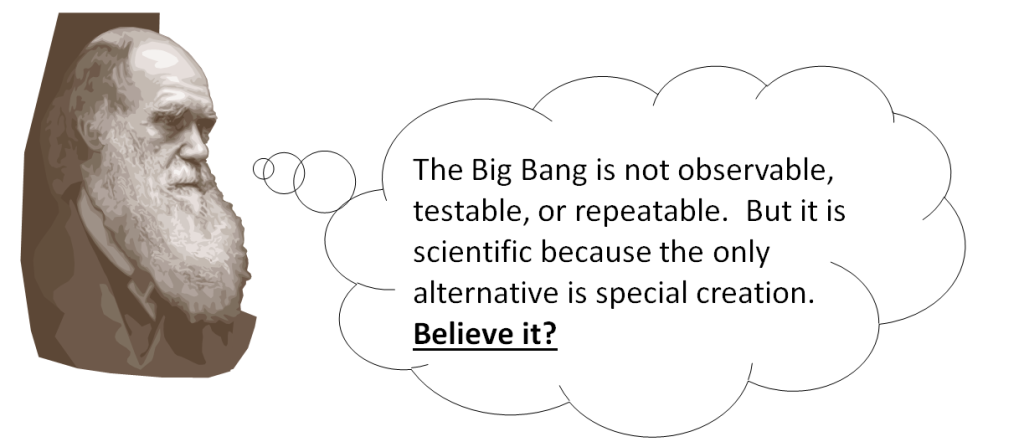
But How Could So Many Smart People Be Wrong?
Recall that for over 1000 years the best minds believed the earth was at the center of the solar system and the sun and other planets revolved around it in epicycles.
Over 700 PhD scientists have publicly stated, “We are skeptical of claims for the ability of random mutation and natural selection to account for the complexity of life. Careful examination of the evidence for Darwinian theory should be encouraged.”
Why did God create the “lights in the expanse of the heavens”?
See Genesis 1:14-19.
If you were out hiking and found a pocket-watch, would it be reasonable to assume that it was formed by chance?
The sun, moon, planets and stars move about in the heavens with a precision that exceeds the best clocks man has ever made! Is it reasonable to assume that they were formed by chance? See Romans 1:20.
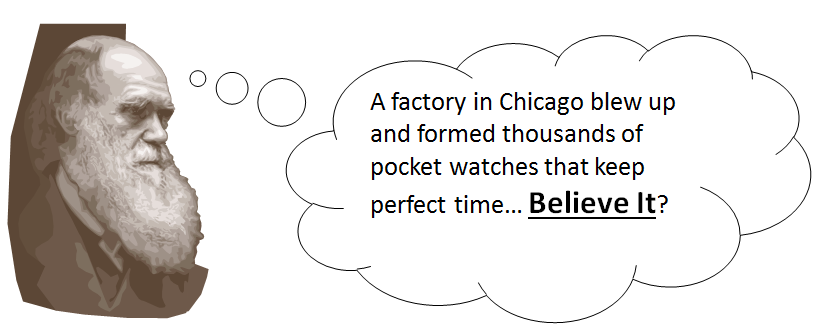
What does it mean that God created the plants and animals “after their kind” (Genesis 1:11,12,21,24,25, 6:19-20)?
Have scientists ever observed a life form successfully reproduce in a manner that is not “after its kind”?
Think: have scientists ever observed peppered moths reproduce to give monarch butterflies? hummingbirds? anything but a peppered moth? Have scientists ever observed Darwin’s finches reproduce to give sparrows or pigeons?
Have scientists with all of their scientific knowledge and technology ever succeeded in causing a life form to reproduce so as to form a new “kind”?
Think: after subjecting hundreds and thousands of generations of fruit flies to radiation and other means to induce “mutations”, have scientists ever obtained a housefly? A dragonfly? A new sort of fly never seen before?
In spite of thousands of years of careful and diverse dog breeding, have breeders ever developed something entirely new that is not a dog?
Does the fossil record indicate that life forms in the past reproduced in a manner not after their kind to produce the billions of transitional forms Darwinian macro-evolution predicts?
“As is well known, most fossil species appear instantaneously in the fossil record.” (Evolutionist Tom Kemp, Curator of the University Museum at Oxford)
“The known fossil record fails to document a single example of phyletic evolution accomplishing a major morphologic transition.” (Evolutionist Steven M. Stanley)
“Despite the bright promise that paleontology provides us a means of “seeing” evolution, it has presented some nasty difficulties for evolutionists, the most notorious of which is the presence of ‘gaps’ in the fossil record. Evolution requires intermediate forms between species and paleontology does not provide them.” (David Kitts, evolutionary paleontologist, head curator of the Dept. of Geology of the Stoval Museum).
“All paleontologists know that the fossil record contains precious little in the way of intermediary forms; transitions between major groups are characteristically abrupt.”
“The family trees which adorn our textbooks are based on inference, however reasonable, not the evidence of fossils.” (Evolutionist Stephen J. Gould, Professor of Geology and Paleontology at Harvard).
Is it therefore reasonable to believe that the incredible diversity of life we observe in the world today is the result of life forms in the past reproducing in a manner that is not after their kind? See Romans 1:20.
How was the creation of man different from that of the animals?
See Genesis 1:26-27.
What does it mean that man was created in the image of God? Contrast Jude 1:10.
The greatest scientific and technical achievement of mankind in all of history and the culmination of thousands of years of scientific knowledge and technology is the space shuttle: it’s rocket science!

And yet biologists have discovered that a single celled bacterium is infinitely more complex than the space shuttle, and a human being is infinitely more complex than a single celled bacterium.
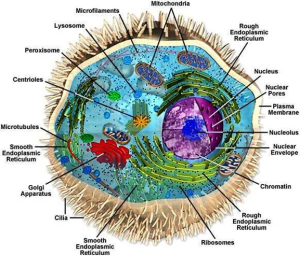
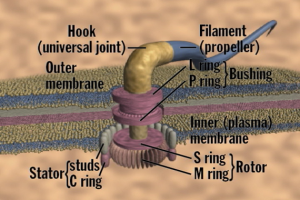
No one has ever succeeded in permanently restoring life to a living creature that has died, even though all of the material parts are still there. Much less has anyone ever succeeded in creating even the simplest form of life from scratch in the laboratory. Is it therefore reasonable to believe that something infinitely more complex than the space shuttle came into existence by chance? See again Romans 1:20.

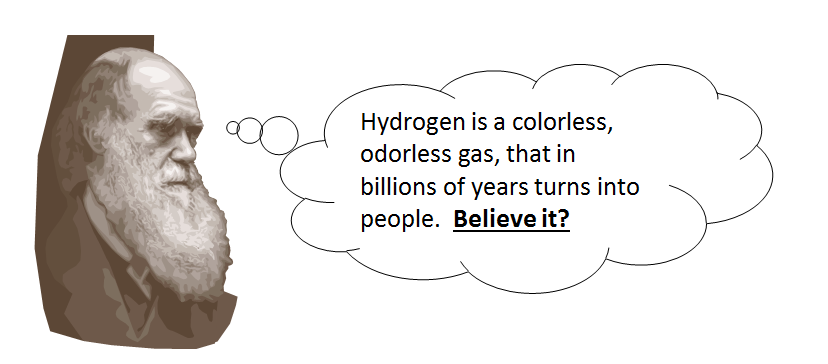
What was God’s original command to man?
See Genesis 1:28, 9:1,7, 35:11.
What does that mean physically? See Psalm 127:3-5.
What does it mean spiritually? See Galatians 5:22-23, 4:19, 1 Timothy 3:4-5.
Why did God create man?
See James 2:23, 3John 1:4.
How does the Bible describe God’s original creation?
See Genesis 1:4,10,12,18,21,25, and especially Gen 1:31.
What does this teach us about God’s original intention for man? See also Isaiah 45:18.
Is that still his intention? See Jeremiah 29:11, Rev 2:7, 21:1-7.
Scriptures to Memorize:
There is but one God, the Father, from whom are all things, and we exist for Him; and one Lord, Jesus Christ, by whom are all things, and we exist through Him.
1 Corinthians 8:6
Since the creation of the world God’s invisible qualities—his eternal power and divine nature—have been clearly seen, being understood from what has been made, so that men are without excuse.
Romans 1:20 NIV
The fool has said in his heart, “There is no God.”
Romans 14:1
Assignment
Read Genesis 1-2.